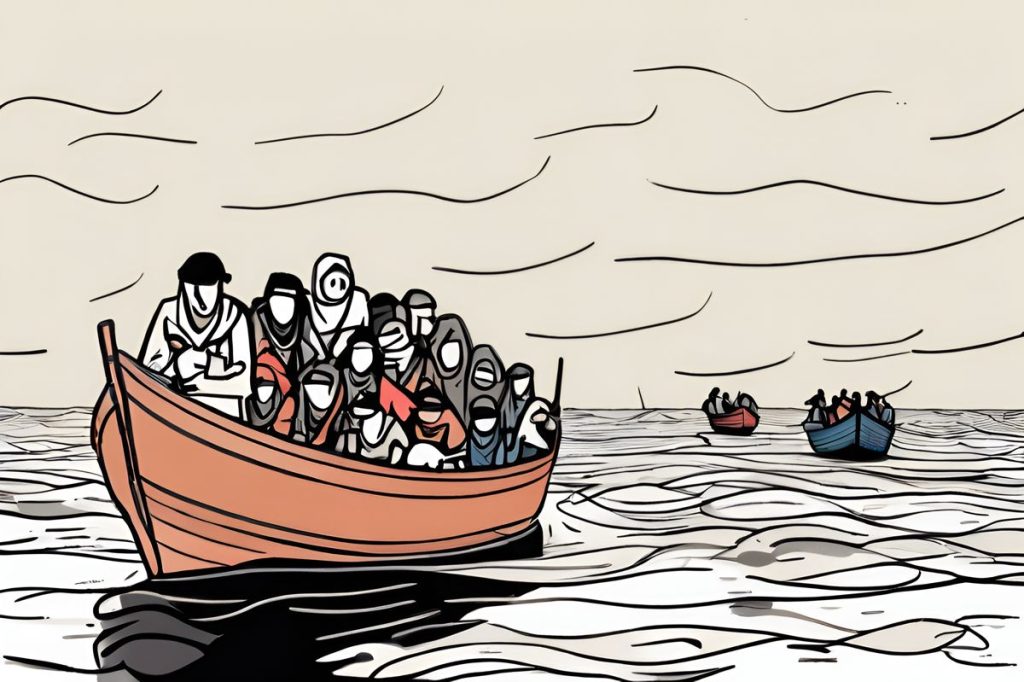A humanitarian crisis arose in Cyprus as 147 migrants arrived from Lebanon, paying $2,500 each for a perilous journey across the Mediterranean. Local authorities detained the boat drivers, sparking debates on human smuggling and the complexities of forced migration.
What is the humanitarian crisis unfolding in Cyprus with migrants from Lebanon?
A humanitarian crisis emerged as 147 migrants were intercepted near Cape Greco after departing from Lebanon. They undertook a dangerous sea journey in search of safety, paying $2,500 each. Upon arrival, they were provided care at a local reception center. The incident highlights the dire migration challenges in the Mediterranean and sparks debates on how to address human smuggling while considering the broader migration context.
A Perilous Journey
A serious humanitarian event unfolded over the weekend as two boats carrying a total of 147 migrants were intercepted near Cape Greco after departing from Tripoli, Lebanon. The vessels arrived on Cypriot shores in an incident that underscores the continuing challenges of migration in the Mediterranean region. Among the new arrivals were individuals from various demographics, including men, women, and children, highlighting the desperate circumstances that force families to undertake such dangerous crossings.
Local authorities acted promptly, detaining two individuals believed to be the boat drivers, a 19-year-old and a 21-year-old. Their detention by Famagusta district court follows testimony from the migrants, identifying them as responsible for navigating the boats. These events raise complex questions about the nature of human smuggling and the fine line between victim and perpetrator in the context of forced migration.
The Cost of Hope
The migrants, each having paid $2,500 to an unspecified person in Lebanon, embarked on a hazardous journey across the sea, seeking safety and a chance for a better life. The first boat brought ashore 30 people—13 men, six women, and 11 children. The second was laden with 117 individuals, including 92 men, eight women, and 17 children. Their arrival in Cyprus was the culmination of a trip fraught with risk, driven by the hope of escaping difficult conditions in their home country.
Upon their arrival, the migrants were moved to Ayia Napa marina before being transported to the Pournara reception center, where their immediate needs could be addressed, and their legal status could be assessed. This incident reflects a larger pattern of migration from the Middle East to Europe, as individuals and families flee conflict, economic collapse, and human rights abuses.
The Debate on Smuggling Charges
The situation has sparked a debate on the island about how to handle those who facilitate the crossing. There is growing concern among MPs about treating boat drivers as smugglers, particularly if they, too, are victims of the larger smuggling networks that profit from these perilous journeys. Disy MP Rita Superman has spoken out, suggesting that the real criminals are those who organize such trips and have extensive networks in both origin and destination countries.
Superman emphasized that the boat drivers are often migrants themselves, who may have agreed to pilot the vessels in exchange for a reduced passage fee. This nuanced perspective is critical in developing an understanding of the migrant crisis that goes beyond the simplistic categorization of individuals into victims and villains, considering the broader context of these migrations.
A Continuing Challenge
As the world grapples with unprecedented levels of displacement, incidents like the one off the coast of Cape Greco serve as stark reminders of the human cost of conflict and economic despair. The international community continues to search for viable solutions to manage migration flows while respecting the rights and dignity of those who risk everything for the prospect of a safer, more stable life.
In the meantime, Cyprus remains on the frontline of this global challenge, facing the need to balance border security with humanitarian obligations. The stories of those 147 migrants who arrived from Lebanon are but a small chapter in the ongoing narrative of our times, a testament to both human vulnerability and resilience.
What is the current humanitarian crisis unfolding in Cyprus involving migrants from Lebanon?
A humanitarian crisis emerged as 147 migrants arrived in Cyprus from Lebanon after undertaking a dangerous sea journey, paying $2,500 each for the perilous trip. The incident highlights the challenges of migration in the Mediterranean and raises debates on human smuggling and forced migration.
What were the circumstances surrounding the arrival of the migrants in Cyprus?
The migrants arrived in Cyprus after departing from Tripoli, Lebanon, on two boats. Local authorities detained two individuals believed to be the boat drivers, sparking discussions about human smuggling and the complexities of migration. The migrants were provided care at a reception center upon arrival in Cyprus.
How did the migrants afford the journey from Lebanon to Cyprus?
Each migrant paid $2,500 to an unspecified individual in Lebanon for the dangerous sea journey to Cyprus. The high cost of the trip underscores the desperate circumstances that drive individuals and families to risk their lives in search of safety and better opportunities.
What are the broader implications of this incident for migration in the Mediterranean region?
The incident in Cyprus is a stark reminder of the ongoing challenges of migration, particularly in the Mediterranean region. It highlights the need for a comprehensive approach to address issues of human smuggling, forced migration, and the complexities of migrants’ journeys in search of safety and stability.

